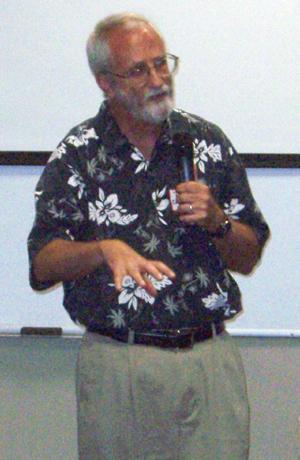
By Celine Klosterman
DAVENPORT – True peace comes from justice, and true freedom comes from following a path toward mindfulness.
Author and peace activist Tom Cordaro shared that message with about 85 people at St. Ambrose University in Davenport on Sept. 11, during a presentation titled “Living Unafraid: A Biblical Path to Freedom.” His talk was sponsored by Pax Christi Quad Cities, the Sisters of Humility in Davenport, Sisters of St. Benedict in Rock Island, Ill., and Ambrosians for Peace and Justice at St. Ambrose.
We live in a time of fear and economic crisis, noted Cordaro, who wrote the book “Be Not Afraid: An Alternative to the War on Terror” and has worked at the national level of Pax Christi for 30 years. He said some economists believe current economic struggles have roots in the terrorist attacks that took place Sept. 11, 2001. But while the United States wanted to prevent future attacks and offer victims a sense of justice, the country’s response was “short-circuited” by a rush to war, he said.
He criticized the effectiveness and expense of the war on terror, which TIME magazine in late 2008 reported cost $1 trillion. He lamented what he said was the U.S. government’s emphasis on fear in justifying the war, and said the war was not in line with the principles on which the United States was founded.
Later, Cordaro contrasted two definitions of peace: one based on enforced order, and the other centered on justice. In the U.S. view of peace as enforced order, resources are limited. Competition results, and acquiring and controlling resources becomes people’s top priority.
Peace as enforced order preserves the social hierarchy, can mask injustices and create underlying conflicts that are hard to identify and resolve, Cordaro said. But the Judeo-Christian tradition offers a model of peace as an enterprise of justice, he said. In this perspective, resources are plenty and should be distributed evenly. People embrace the idea of “enough” and realize the difference between what they need and desire.
The perspective of peace as an enterprise of justice also stresses the common good and requires constant dialogue between the individual and community about rights and responsibilities.
Cordaro later offered suggestions for finding “a spiritual path to freedom” from fear. This path centers on striving toward mindfulness, not acquisition. Contemplative prayer can help on the journey, he said. He said mindfulness is interwoven with four other virtues: compassion, solidarity, humility and freedom. Compassion asks us to share in people’s anguish and pain, to be powerless with the powerless, vulnerable with the vulnerable.
But Cordaro warned against allowing our compassion to be expressed through a service model that’s ultimately about control, an effort to pull people up to our level. Instead, we need to learn the virtue of solidarity. We must relinquish dividing lines between ourselves and those we seek to serve by walking beside them and being willing to learn from those we pity.
Humility opens us to being changed by people we consider marginalized. It also helps us realize we can’t solve every problem — and accepting that realization leads to freedom.
We don’t have to make this journey alone, Cordaro said. Many people seek the same freedom.
The presenter’s emphasis on mindfulness, compassion, humility and solidarity with marginalized people echoes what the Sisters of St. Benedict at St. Mary Monastery in Rock Island, Ill., work on daily, said attendee Sister Charlotte Sonneville, OSB. “I was very grateful for his message. I thought his style of presentation was very affirming.”
She and attendee Nora Dvorak, a volunteer in the Davenport Diocese’s social action department, both said they wished more men had been in the overwhelmingly female audience.
Dvorak praised the presentation’s content, however. “It was a wonderful opportunity for our community to have a better understanding of what a community and nation might do to be peaceful.”
Cordaro “called on all of us to take up our responsibility to create a national narrative based on our founding values of justice, human rights, freedom and the common good,” said Sister Jan Cebula, president of the Sisters of St. Francis in Clinton. “I appreciated the breadth of his message, ranging from the systemic to a personal spiritual path moving us from fear to freedom.”








